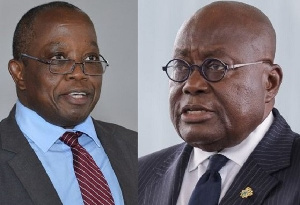Dear Daniel Yaw Domelevo,
I am touched to write your tribute at a time you’re still part of the audience. I must, however, confess that I write this tribute in shame. It is a shame born out of the fact that that I was part of the crowd that helplessly watched your crucifixion.
Yours was like the story of Alhassan and the bullish soldier, a story often told in Tamale with laughter, but which is laden with tragic lessons of our collective failures to support those who rise and risk their lives to improve our miserable lots.
The Tamale tale is about a soldier in the military era who was notorious for terrorizing a community situated close to the barracks. He would appear at the waakye seller’s joint every morning, seize whatever portion he wanted, and whoever dared to complain was soundly beaten. He was a hugely built man whose towering frame imposed a curfew of fear wherever he went.
No one in the community could match him in strength, and this was a source of embarrassment to the men because the women looked up to them for protection.
One day, the young men of the community met and agreed that, together, they could overpower him and give him a sound beating. The pain of the beating and the shame of the humiliation was enough to scare the soldier from that community.
As part of the operation, one man was to grab the soldier’s hands against his body from behind. The rest would join in and get him onto the ground, tie him up, and teach him the lesson of his life.
On the agreed day, everything appeared to be working according to plan. The “fighters” gathered at the food seller’s joint and mixed with the customers. The soldier arrived and, as usual, began to bulldoze his way through. When he turned to face the food seller, a young man called Alhassan rushed and held him from behind as planned.
But nobody moved in to help Alhassan. They rather applauded and exclaimed, “Alhassan has caught the soldier!”
Mr. Domelevo, Alhassan’s fate was not different from what you have been through when you decided to go after the powerful senior minister, Yaw Osafo Maafo, and the murky Kroll Associates contract. A section of Ghanaians hailed you when you disallowed, surcharged and asked Mr. Osafo Maafo and others to refund the money to the state. Besides the many procurement infractions with the contract, the senior minister did not provide evidence of work done during the audit.
Those loyal to the governing party, however, did not take this lightly. Osafo Maafo was one of the untouchables in our republic at the time and everyone could predict that you were up against something bigger than you.
You were armed with a good conscience. You were doing what would stop the excessive bleeding of our anemic national purse. And you deserved our support. But we failed you.
A section of the media failed you. Some were silent because of the paralysing fear of speaking up these days. Others became the willing platforms for mindless mudslinging against your reputation.
President Akufo-Addo, who rode into power on the moral high horse of incorruptibility, appeared more interested in saving the face of Osafo Maafo than saving the public purse, which he had sworn to protect. He is the commander of the vicious and vindictive army that mobilised to get you out.
The board chairman of the Audit Service, Professor Edward Dua Agyeman, was one of those who failed you. While being the Audit Service board chairman, he also worked in Osafo Maafo’s office and openly represented Osafo Maafo in court in the case between Osafo Maafo and the Auditor-General. Prof. Dua Agyeman had occupied your position with nothing much to show. He will be better remembered and “rewarded” for his role in getting Ghana’s best and most impactful Auditor-General out of office, and not for his occupation of that same position, which was moribund until you gave it some spark.
Some of us have inducted Prof. Dua Agyeman into the hall of shame.
But, apart from individuals, some institutions also failed you. When it mattered most, the Supreme Court of Ghana failed you. I still do not understand why the Supreme Court failed to rule on whether or not the “evidence” of work done, which Osafo Maafo and others kept from your team of auditors during the audit, was confidential and national security in nature.
The High Court had given the Supreme Court a very straightforward job to do: the senior minister and his people did not give the Auditor-General some critical information during the audit. The senior minister and his people are now telling this High Court that they refused the Auditor General the information because it was confidential and national security in nature.
Supreme Court, you have the power to determine whether this information is so confidential that it should have been kept away from the Auditor-General. Rule on this material issue and let us proceed with the case here at the High Court. This was what the High Court asked from the Supreme Court.
Kroll Associates’ duty was to investigate corrupt government officials and help Ghana to recover stolen assets from private individuals and institutions. That was definitely not secret information that was to be kept from the Auditor-General of Ghana, who is responsible for auditing sensitive institutions like the National Security Ministry, the Defence Ministry and the Presidency. It would have been absurd for the Supreme Court to rule that the information was too confidential to be given to the Auditor-General.
If the Supreme Court had ruled that the information wasn’t national security in nature, it would have influenced the direction of the substantive case at the High Court. Osafo Maafo and his people would have had no reason to have kept it from the Auditor-General during the audit.
But, Mr. Domelevo, the Supreme Court did not do what the high court asked it to do. The judges rather asked you to go and inspect the information at Osafo Maafo’s ministry, the same information that had been kept from you because it was deemed to be too confidential.
This was despite your argument that that stage had been passed and a bad precedent would be set in auditing. A public officer is given money to buy 10 vehicles, but he buys five and embezzles the rest of the money. He cannot account for the five vehicles when auditors visit a year after the transaction. If he’s caught he can, however, buy the remaining cars after the audit is completed and ask the auditors to come back and see them.
If the information was available, you argued, it should have been given to the auditors in the long period of the audit and after the management letter you issued in the Osafo Maafo and Kroll case. But you were asked to go and inspect it.
Before you had the time to inspect the information, however, President Akufo-Addo forced you to proceed on leave. A day after you began that bizarre leave, the man he asked to act in your stead said he had inspected the information and found everything to be satisfactory.
The Supreme Court then conveyed this message to the High Court, which then ruled in Osafo Maafo’s favour, saying the Auditor-General had, after all, inspected and was satisfied with the evidence of work done, which was the main subject of contention.
We watched helplessly as you were bastardised by the outcome of that shameful process.
A few men and women tried to fight for you on the forced leave. Some civil society groups did their best, but they were still helpless in getting you back to the office.
Even some individuals and civil society groups went to the Supreme Court to challenge the legality of the president’s action against you. Again, the Supreme Court failed you because it is yet to set a date to hear the matter. It’s been seven months since the first case was filed.
The Supreme Court could have dealt with this case in two weeks if the judges treated it as an important and urgent constitutional matter, an ugly manipulation and interference which was dealing a nasty blow on the independence of the Auditor-General.
The Supreme Court, in the run-up to the 2016 and 2020 elections, decided some important cases in a matter of weeks to pave the way for the registration and voting. So why has that court still not set the date for the hearing of the suits challenging the actions of the president?
If I were the actors in the cases, I would withdraw them from the Supreme Court. Of what use would it be to get a judgment which cannot be enforced?
While you were away on that forced leave, a massive shake-up in the form of transfers hit the Audit Service. Some of the key men and women you relied on to execute your duty were scattered around the country like an ancient planting method. Your legal department was already understaffed, but the head of legal who prosecuted the Osafo Maafo case was transferred to Cape Coast.
Mr. Domelevo, your return to the office had very little significance to many because you were left with about three months to go on retirement. But the powers in charge did not have the patience to tolerate you for one more day.
A day before you resumed, letters signed by the Audit Service board chairman were leaked to the media, suggesting that you were a year older than your stated age because there was a change of date somewhere in your SSNIT records. Your explanation sounded believable and your name “Yaw” corresponds with your stated date of birth, and not with the one the board chairman wanted us to believe. The board chair also claimed you were a Togolese, and not a Ghanaian.
Apart from those whose conscience has been irredeemably seared by partisan politics, this new level of pettiness was greeted with unanimous condemnation from both sides of the political divide as well as independent-minded persons. Some even thought Prof. Dua Agyeman had created so much disaffection for the president and urged the president to punish him for such vindictiveness.
But the president showed his support for the board chairman and asked you to go home. The lawyer that he is, one would have thought President Akufo-Addo, would call for an investigation and followed before concluding on the allegations of the board chair of the Audit Service.
Your departure broke hearts, but we still treated you like Alhassan and the soldier. Elsewhere, President Akufo-Addo could have lost the 2020 election for shamefully asking you to proceed on leave. Massive and sustained protests against such an unfortunate action by the president would have forced him to recall you or lose the election.
But, here, it was different. Even the modest “Red Friday” protests that used to be held have dissipated. As I once said at a public lecture, many of those who organised or championed the OccupyGhana protests are themselves occupying cozy places and safeguarding the very rot they marched against when John Mahama was president.
My heart bleeds, not only for you but for the future of our country. At the same time, I am happy you did what is right and got kicked out. It’s better that way than to act like those who preside over the rot and complain privately that their hands are tied.
Mr. Domelevo, like Alhassan, you were not naïve. You knew what you signed up for. You knew the danger associated with your actions. You knew the benefits you and your family would have derived from that office if you had behaved like many public servants. If you decided to look away while the looting brigade operated, knowing that your share of the booty would always find its way to you, you would still have been in office. And your descendants would have had properties in Trassaco Valley or abroad.
You knew your situation might worsen when you decided to leave the World Bank and head to public service in Ghana, not to make money but to serve. You knew that you were putting your life and the lives of your family members in danger by doing what you did. You knew you would be fought. You knew you could be killed. You knew you would be maligned. You knew that if you did not pretend to fight corruption, but actually fought it, corruption would fight back.
But you went ahead on the lonely and thorny path of nobility. And I see you as a winner. Your name carries more weight than the combined power and wealth of those who hounded you out of the arena of lonesome burden in the service of your country. Many respect you more than the President.
But the nation still loses because of what they did to you. The effect of your persecution is enormous. And the victims are many. There is another story similar to that of Alhassan and the soldier.
Another village also had a wicked chief whose elephant was destroying their farms. Nobody dared to confront the chief for the fear of being executed. When the destruction got out of hand, the villagers decided to confront the chief as a group because there was safety in numbers.
The plan was that they would march to the palace and one of them would shout, “Chief, your elephant…” and the rest would continue, “is destroying our farms.”
On the said date, however, the man was greeted with silence after shouting “Chief, your elephant.”
“What has my elephant done?” the chief asked.
Silence.
“I said what has my elephant done?” the chief was visibly angry.
“It’s been many years and it’s still one elephant. We came to suggest that you get a female elephant in addition to this one so they can multiply,” the man said, and the chief applauded.
The people joined in the applause, but they and their descendants suffered the destruction of multiple elephants.
Ghana will suffer the consequences of this betrayal for many years to come.
************
You can reach the writer, Manasseh Azure Awuni, through azureachebe2@yahoo.com.
Source: Manasseh Azure Awuni








